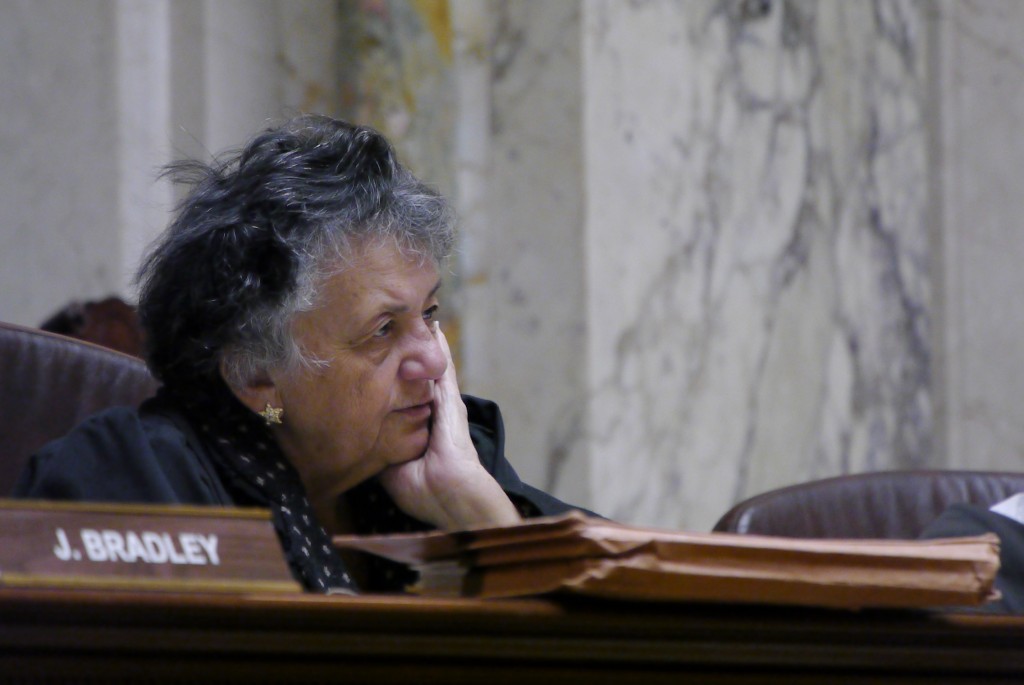One year after Justice Shirley Abrahamson retired from the Wisconsin Supreme Court, Gov. Tony Evers issued a proclamation recalling her remarkable legacy:
*The first woman to serve on the court, even though she had no judicial experience, when Democratic Gov. Pat Lucey appointed her in August 1976. She was the only woman on the court for 17 years; in 1993, Gov. Tommy Thompson appointed Milwaukee County Judge Janine Geske.
*First female chief justice of the court in 1996 and longest-serving chief justice, since Abrahamson led the court until 2015.
*Longest-serving Supreme Court justice in Wisconsin history, having served for 43 years.
*Elected to a 10-year term in 1979, and re-elected in 1989, ‘99 and 2009.
In his proclamation, Evers said Abrahamson “issued hundreds of opinions and dissents, and never wavered from her sworn commitment to impartiality, the protection of individual rights, and the equal application of justice.”
Equally as important, the governor said, was Abrahamson’s work to “to diversify the field of law and broaden the circle of voices represented within the justice system, expanding volunteer opportunities and furthering public education programs.”
In a year celebrating the 100th anniversary of women’s suffrage, Evers added, Abrahamson is a “trailblazing” icon who provides “inspiration to generations of American women.”
Abrahamson, 86, has declined interviews to discuss her remarkable legacy or the conservative justice, Brian Hagedorn, elected to replace her last year. That’s too bad, because her reflections should be part of Wisconsin’s historical archives.
Abrahamson’s health is uncertain. She disclosed in 2018 that she was being treated for cancer and participated by speakerphone in some oral arguments in her final months on the court.
If Abrahamson won’t talk about her legacy, consider what others said in a Capitol ceremony in her honor last year.
“Among jurists I have encountered in the United States and abroad, Shirley Abrahamson is the very best – the most courageous and sage, the least self-regarding,” U.S. Supreme Court Justice Ruth Bader Ginsburg said in a recorded testimonial. “She has inspired legions to follow in her way, to strive constantly to make the legal system genuinely equal and accessible to all.”
Former Gov. Jim Doyle remembered when he was Dane County district attorney and argued cases before Justice Abrahamson. “You better get to the point, you better have thought through what you had to say, and you weren’t going to waste her time.”
Doyle also noted Abrahamson’s legendary work habits. After the Capitol closed, and everyone else had gone home for the day, the lights in Abrahamson’s second-floor chamber would be on. “You knew that Shirley Abrahamson, and one or two beleaguered law clerks, were up there working for us,” Doyle said. “Imagine what an honor it is to have the things that you are most criticized for being that you are too smart and you work too hard.”
Geske said Abrahamson “inspired me and thousands of young girls and women to follow in a path to becoming lawyers, and in many cases, judges.”
U.S. Appeals Court Judge Diane Sykes served with Abrahamson on the state high court from 1999 until 2004. The conservative Sykes and liberal Abrahamson, at some point in their careers, have been listed as potential U.S. Supreme Court appointees.
“I’m grateful as well for all the times she challenged me on my opinions, though that’s easier to say now than back then,” Sykes said at the event honoring Abrahamson. “We agreed on many cases, disagreed on some, and the strength of her work always made mine better.”
Wisconsin Public Radio reported that Abrahamson rose from her wheelchair to offer a few comments. “From the day I took the oath of office, I believed in the concept of an independent judiciary. I still believe in it,” Abrahamson said, adding:
“I have always been opposed in an election — that’s a record. But the other record is I won, and I never received less than 55 percent of the vote.”
The last four years of Abrahamson’s tenure were her toughest. In 2015, voters rewrote the state Constitution to let the seven justices elect the chief justice, instead of the most senior justice. Conservative justices then replaced Abrahamson with Chief Justice Patience Roggensack.
And in 2016, Abrahamson mourned the death of her husband, Seymour, an internationally known geneticist and retired zoology professor. They were married for more than 62 years.
Steven Walters is a senior producer with the nonprofit public affairs network WisconsinEye. Contact him at stevenscotwalters@gmail.com

